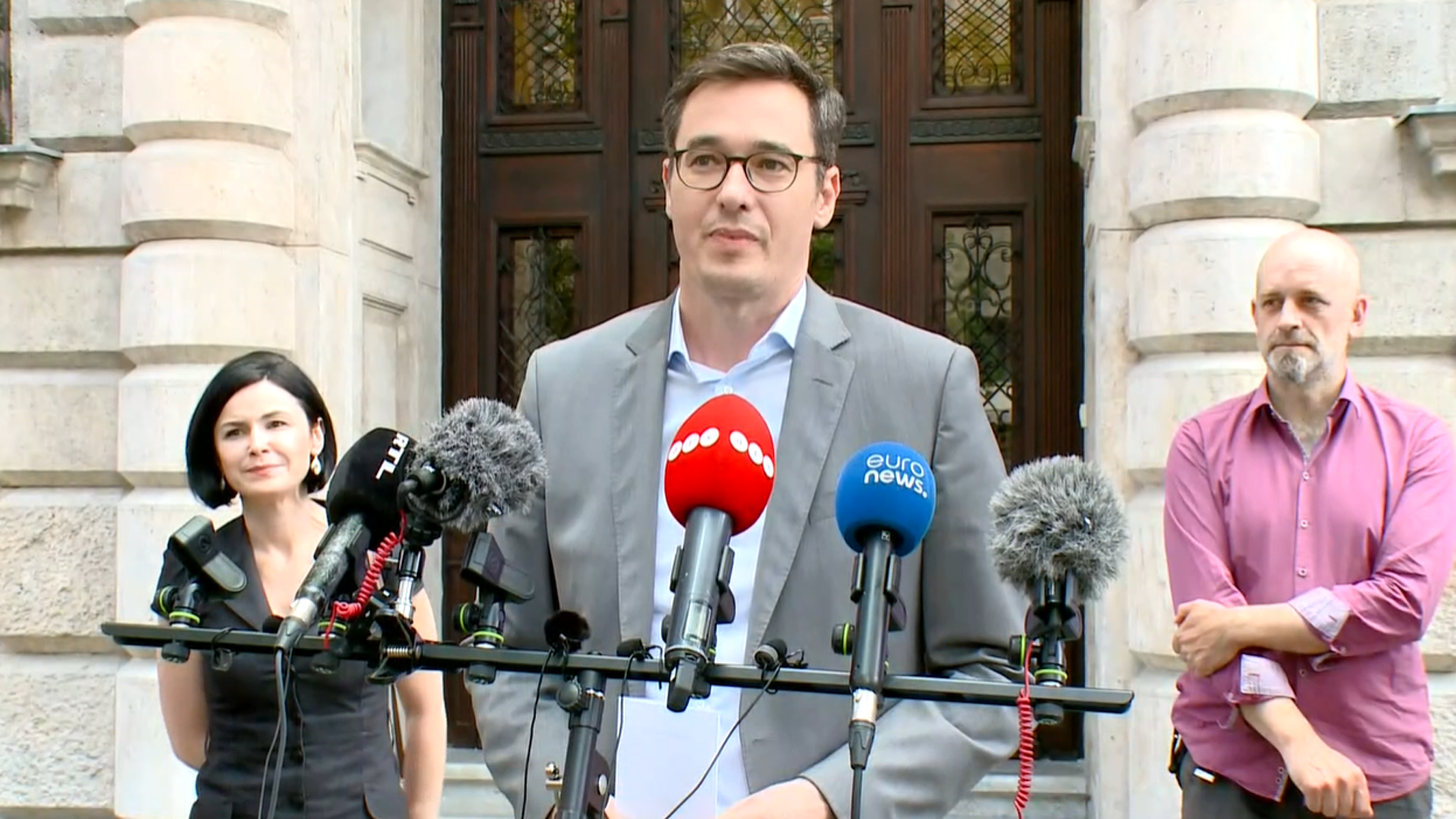Hungary's government won't confirm or deny using Pegasus spyware on journalists

- Stay updated on the latest news from Hungary by signing up for the free InsightHungary newsletter:
Hungary's government this week aimed to contain fallout over revelations that some 300 Hungarian citizens were targeted for surveillance by powerful spyware that targeted the mobile devices of journalists, politicians, lawyers and others.
Use of the Pegasus spyware, produced by Israel-based firm NSO Group, was uncovered through an investigation by an international media consortium led by Paris-based press organization Forbidden Stories. The investigation found that individuals had been targeted for spying in Hungary, Pakistan, Saudi Arabia, Mexico, Azerbaijan, India, France, and other countries.
Forensic analysis of several mobile devices in Hungary found that Pegasus had been used to break into the smartphones of at least five journalists, including those of Szabolcs Panyi and András Szabó of investigative reporting outfit Direkt36, which participated in the investigation.
The phone numbers of opposition politician György Gémesi and Hungarian Bar Association president János Banáti were also found on a leaked list of potential Pegasus targets, but their phones were not able to undergo forensic examination to confirm that they had been breached.
The malware is able to gather an array of data from mobile devices, including emails, text messages, photos, videos and text documents. It is able to retrieve messages even if they are sent via mobile applications with end-to-end encryption, and can activate the phone's microphone or camera.
While the investigation did not show conclusively who had deployed the spyware against the targeted individuals, numerous signs suggest that the Hungarian government directed the spying operation.
NSO Group insists that it only sells Pegasus to governments and state agencies, and Direkt36 sources including a former Hungarian intelligence officer and a former employee of NSO said that Hungary's government had indeed purchased and used the spyware.
While no officials have explicitly denied that the government purchased and used Pegasus against journalists and political opponents, all who have spoken on the matter insist that covert surveillance in Hungary occurs only in accordance with relevant laws.
But Hungary's laws regulating covert surveillance offer the government exceptionally broad authorization, requiring only ministerial approval for such actions. The same minister that approves the surveillance is also responsible for evaluating whether it was conducted lawfully.
Speaking to Népszava in Brussels, Justice Minister Judit Varga (who herself would have to sign off on any covert surveillance), would not confirm that Hungary had purchased the Pegasus spyware, but said, "Let’s not be ridiculous, every country needs such tools! It’s an illusion if anyone tries to make an issue out of it."
In a press conference on Thursday, the prime minister's chief of staff Gergely Gulyás said that the Pegasus scandal was not discussed at a cabinet meeting the previous day, and that the government has no plans to conduct an investigation into the spying allegations.
Gulyás added that he supports the convening of the national security committee to examine the issue if there is genuine evidence that surveillance was conducted illegally.
However, opposition members of parliament's national security committee earlier this week called for an emergency session to question Hungary's intelligence services and Interior Minister Sándor Pintér on the alleged use of the spyware.
But Fidesz's majority on the committee signaled it would not appear at such a session, saying the allegations were "baseless" and served only to "stir up political passions." (Fidesz members of the committee regularly block sessions called by opposition delegates in cases that are potentially sensitive to the ruling party.)
Prime Minister Viktor Orbán has yet to react to the allegations.
Orbán calls for referendum amid mounting political pressure
In a video on Facebook Wednesday, Prime Minister Viktor Orbán announced that the government will initiate a referendum on what it calls its child protection measures, but which critics argue stigmatize and discriminate against LGBTQ people.
The unexpected announcement - which immediately followed a government decree allowing referenda, which had been previously disallowed because of the Covid-19 pandemic - came as Orbán faces increasing pressure in Hungary and the European Union over his government's adherence to the rule of law, and heightened scrutiny over a major international spying scandal.
As we reported last week, the European Commission launched two separate infringement proceedings against Hungary for its treatment of the LGBTQ community, including a law passed in June that prohibits the display or promotion of content to minors that depicts homosexuality.
Days later, the Commission issued its 2021 Rule of Law report which pointed to several areas of deficiency in Hungary's adherence to democratic standards. The report states that "the implementation of the anti-corruption strategy is ongoing but its scope remains limited." It also referred to shortcomings regarding "political party financing, lobbying and ‘revolving doors’."
The report also warns of "risks of clientelism, favoritism and nepotism in high-level public administration as well as risks arising from the link between businesses and political actors."
The rule of law report, which was introduced in 2020 in reaction to concerns over developing autocracies in Hungary and Poland, was slammed by Hungarian officials, who accused its authors of bias.
In a Facebook post, Justice Minster Judit Varga claimed that "the latest report of the European Commission focuses on the Hungarian Law on Child Protection," though the report makes not a single mention of Hungary's anti-LGBT legislation.
In the wake of the report's release, the European commissioner of justice, Didier Reynders, told several media outlets that the Commission had rejected Hungary's application for billions of euros in Covid-19 economic recovery funds. Those funds would not be awarded, Reynders said, until Hungary implements judicial reforms and strengthens its anti-corruption frameworks.
It was amid these mounting pressures that Orbán announced the referendum, leading some opposition politicians to call for a boycott of the vote. Independent MP Ákos Hadházy said the referendum was a "distraction and a lying campaign ploy," while Péter Jakab, chairman of the right-wing Jobbik party, said it was a "clear diversion" from the spying allegations facing Orbán's government.
Responding to the referendum announcement, Luxembourg's Foreign Minister Jean Asselborn told Der Spiegel that “we should hold a referendum in the EU on whether we still want to tolerate Orbán.”
“I am convinced that the result would be a clear no,” Asselborn said.
Budapest mayor calls for referendum on Fudan University, antibody screening
Hours after Orbán called for a referendum, Budapest Mayor Gergely Karácsony held a press conference where he announced he would initiate his own poll featuring five questions.
- Do you agree that the Parliament should repeal the law transferring assets to the Foundation for Fudan Hungary University?
- Do you agree that a private company should not be allowed to operate Hungary's highways through a concession contract?
- Do you agree that all residents of Hungary over 60 should have access to free Covid-19 antibody screening?
- Do you agree that Hungary should join the European Public Prosecutor's Office?
- Do you agree that the maximum duration of unemployment benefits should be 270 days (instead of 90)?
The questions represent political issues that Karácsony and the united opposition have recently used as points of critique of Hungary's government under Fidesz.
Budapest's government has sparred with the central government over the construction of a large campus of the Shanghai-based university in the capital, arguing it takes scarce resources away from Hungarian students and indebts Hungary to China.
Budapest also initiated its own antibody testing program for city residents over 60 in an effort to get the government to address reports that the Chinese-made Sinopharm vaccine showed insufficient antibody response in some older recipients. (The most recent results of those tests show that 24 percent of Sinopharm recipients over 60 had not developed adequate antibodies. Among the oldest age group of those 80 and older, 38 percent did not show antibodies.)
The questions must be approved by the National Election Committee before a referendum can be scheduled.



